Fruit Trends in Kenya
For the better part of the last six months we’ve been on the ground making a follow up and conducting farm visits to the farmers we have partnered with. This post will highlight what fruit crops home gardeners and farmers are embracing and the commercial viability of the different fruit types. We encourage sustainable diverse cropping systems where farmers plant more than one crop. This spreads economic risk and offers the opportunity of reducing production costs and increasing profits. The more farmers’ successfully produce more of one type of crop, the more they are whipped by low prices making them a victim of their own success. That’s the greatest irony of farming as dictated by the laws of supply and demand, hence the need for diversified farm systems.
Such diversified systems require thorough planning and close monitoring to cater for the different components. For easy management we recommend 2-3 main crops and a set of rotational crops, for example, we have a farmer initiating a mixed fruit orchard in Murang’a doing hass avocado, tree tomato and apples. A serious fruit farmer should also embrace an integrated pest management strategy and maintain the farm in ways that make them attractive to beneficial insects and pollinators such as bees, and implement interventions to protect them. No pollination, no fruit.
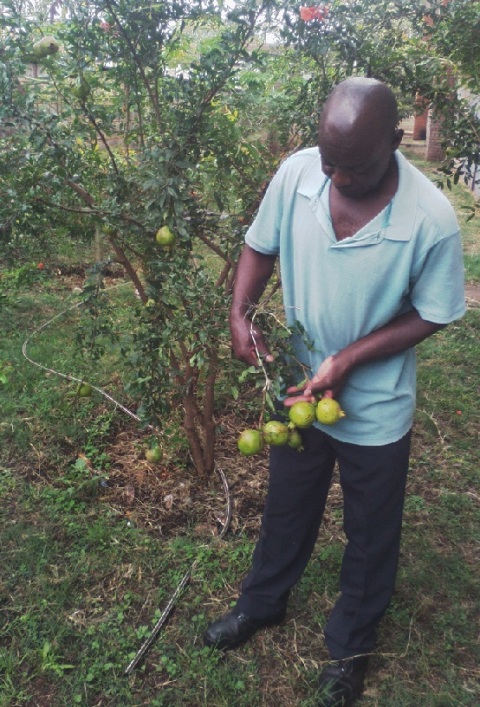
Pomegranate tree in Nairobi
Start with what you can manage as you progress. Farming is a journey, more of a marathon than a short sprint. It requires more resilience and focus on a desired farming venture. There those who get it right in their first attempt and there those who fail initially or severally but later on get it right because they chose not to give up. Grow that which has market potential, whether it is for home or commercial purposes. Copying what your neighbor or other farmers are doing is not a sin; but don’t just copy for the sake of copying. If you can read this post, then you are intelligent enough to do your own research before investing in a given venture. What you settle for has to be a crop that performs well in your locality and thrives in your soil. Test and analyze your soil and optimize it accordingly, the health of the soil determines the health of the plant.
Failure is inevitable, the love and passion of your venture will play an important role in such times. One of our clients insisted on planting apples, grapes and other fruits at the coast just for the love of apples, she even went for high chill varieties against our advice. She failed severally, many apple seedlings she purchased from different nurseries died within the first year. But she understood that there was a price to pay to conduct her own research and know what works for her. Despite of the many failures she now has the privilege of harvesting a few apples of different varieties from her 2 year old plants after 4 years of trial and error. She is now planning to do grapes and apples commercially. Consult widely, do your own research and search yourself too. Identify fruit crop(s) that you will love cultivating, works well for you and can generate good income.
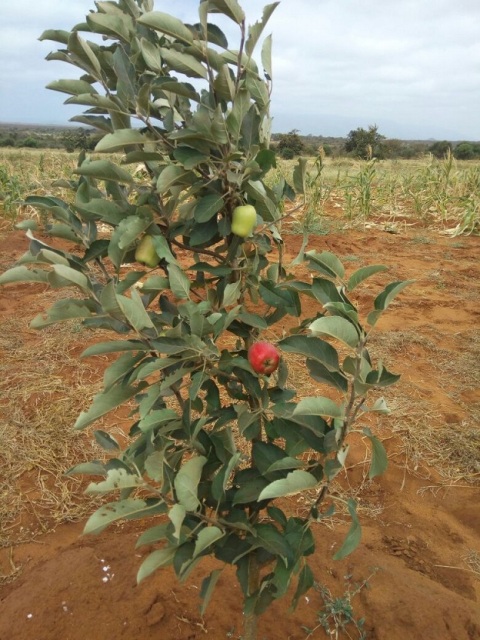
2 year old Apple tree @ the Kenyan coast
Our country is blessed; plenty of different fruit trees and food crops thrive in different parts of the country. Local farmers are spoilt for choice on what to venture in. A typical Kenyan farmer faces a lot of challenges and hurdles from farm to market. The successful ones will be those who will emerge as problem solvers and solution providers despite of the many challenges; those who focus on providing practical solutions to problems experienced by the population rather than sit on a problem or write a thesis/research paper to be archived on the shelves. Globally, our country is a horticultural giant, there is a huge demand for our horticultural products that include; flowers, herbs, veges, fruits and nuts. For Kenyan farmers to meet this demand, best farming practices should be embraced to ensure quality and food safety. Locally, there is a rising demand of healthy farm produce that is free from harmful chemicals. Produce crops that comply with GAP standards from the on-set no matter the target market. Below are some of the fruit varieties that are commercially viable and worth giving a try.
Avocado– The hass variety is the most preferred for those targeting the export market due to its high oil content, appearance and low perishability. There is a niche market for Fuerte and Pinkerton variety locally; there high perishability does not make them good candidates for the export market.
Passion Fruit – The two common varieties are; sweet yellow and purple passion. Both varieties do well locally and there is demand for both in the local market. The export market prefers purple passion; Europe is one of the main markets. In the past few years farmers from Rift valley have shifted to passion fruit cultivation without regret and we are seeing a lot of activities in Uasin gishu, Bomet, and Kericho.
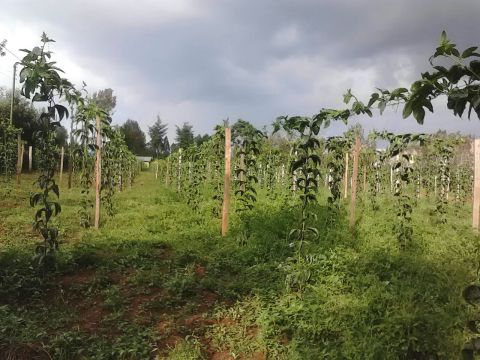
Passion fruit orchard @ the Rift Valley
Mango – There are different mango varieties that thrive in different parts of our country, but so far there is high demand for the Apple mango variety that thrives in hot areas. Other popular varieties include; Kent, Tommy and Haden. There is an emerging export market for Kenyan mangoes in China, hope this holds up.
Citrus– New citrus orchards are being developed in the coast, eastern and rift valley by farmers who are targeting to meet the local demand. Most of the citrus consumed locally are imported because the local supply does not meet the demand. There is need for improving production and quality of local citrus. The different varieties cultivated are: Pixie, Minneola, Clementine tangerine, lemon, Washington navel, Valencia among others.
Strawberry – So far chandler variety is the most successful varieties to cultivate. Most farmers are producing for the local market. We are trying out Quinault variety and some other giant strawberry varieties to see their viability.
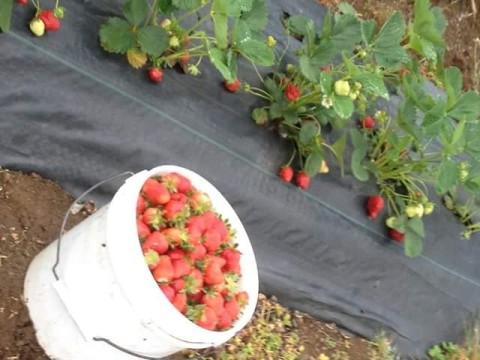
Strawberry harvest in Nyahururu
Tree tomato – A good number of farmers have ventured in tree tomato cultivation to meet local demand. Red oratia is the most grown variety. One can choose to cultivate grafted tree tomato or the non-grafted ones.
Grapes– This is one of the fruits whose potential remains unexploited by the Kenyan farmer despite it doing well in various parts of the country. Most commercial grape ventures are established by wineries and geared towards wine production. Grape plants grown in the country are mostly grown by home gardeners for personal consumption. The local demand for table grapes and raisins heavily relies on imports.
Apples– In the near future high quality locally grown apples will be at the shelves in your grocery store. New apple orchards are cropping up in different parts of the country targeting the local market. Different varieties have been tried and tested in different parts of the country and the results are promising. These varieties include; Cripps pink, Anna, Golden Dorset, Fuji, Gala, Red delicious and Braeburn.
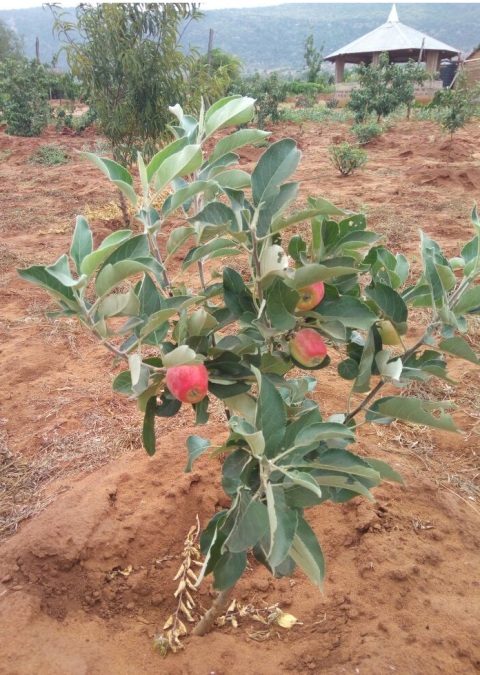
Young Apple Orchard @ the Kenyan Coast
Bananas – This is the most important fruit crop in Kenya. Banana farming has been gaining momentum thanks to attractive market prices and availability of quality propagation material through tissue culture. There are different varieties that perform well in Kenya, study what the market wants and go bananas.
Pears and plums– A good number of farmers in Molo, Limuru and some parts of Kiambu have cultivated pears and plums that they supply to the local market. There are low chill pear varieties that do thrive in warm areas. The hood variety is a low chill variety that has been proven to do well in Kenya. We have distributed a few seedlings to various farmers in western Kenya and Nyanza to gauge their performance.
Kiwi– So far we have no success story on kiwi cultivation, we are still in the infant stages. We can’t confidently say that the kiwi plant thrives in Kenya. The oldest plant we are monitoring is almost 3 years old and we are seeing no sign of fruiting. The greatest challenge in kiwi production is the propagation material. Most kiwi seedlings in the market are propagated from seed; this takes long to fruit or might fail to produce fruit.
There also other fruits which are mostly grown for personal consumption or on a smaller scale. They include Persimmon kaki, Sour sop, Pomegranate, custard apple, star fruit, lychee, guava, loquats, peach, fig fruit, rasp berry, white sapote, jack fruit, apricot and dragon fruit among others. In case of any queries feel free to reach us via mail at admin@plantafruit.org. Fruitful season ahead and remember to consume atleast one fruit a day before any meal.
Posted on May 1, 2017, in Agribusiness, Environment and tagged africa, Agribusiness, apple, climate, conserve, education, environment, farming, fruit, fruit trees, Horticulture, kenya, kiwi fruit, nairobi, nature, nutrition, passionfruit, peach, plants, responsible citizens, science, soursop, trees. Bookmark the permalink. 8 Comments.


Interesting,
Where can we get the seedlings of apples and can they grow in Ruiru?
we have varieties suited for different climatic conditions. We have an outlet in Nairobi at Muthaiga near the golf course where one can pick seedlings
Very good and valuable information for fruit farmers. Keep it up.
i want to know about dragon fruit
i want to know if i can get dragon fruits seeds
Contact 0714118794 for dragon fruit seedlings
Hello,
We are interested to import fruits products from you to Croatia and Slovenia
Our company is working in wholesale and distribution of fruits and vegetable.
How can we cooperate together for your products?
Thanks
can i join, i have avacado trees?